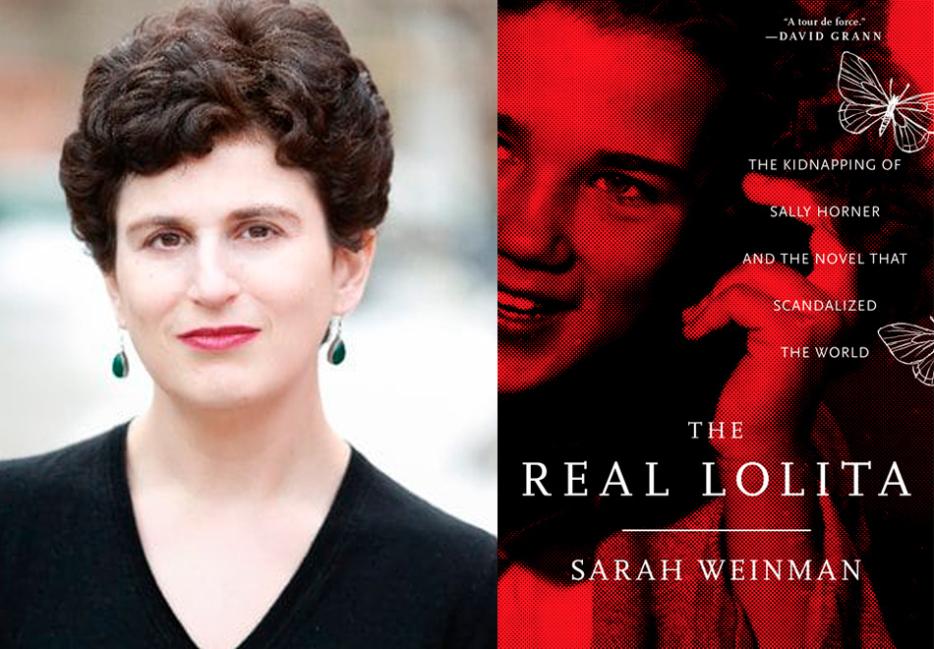When Sarah Weinman first pitched a story to Hazlitt about Sally Horner, the real life kidnapping case that Vladimir gave a brief shoutout to in his 1955 masterpiece Lolita, she had a placeholder title in mind.
"It was March 2014, and I was like, ‘So I have this piece, I think you can call it something akin to the real Lolita,’” she tells me. We’re sitting in the lobby of the Drake Hotel where she is staying in the middle of an extensive book tour; she just came from our shared hometown of Ottawa, where we compared notes on the effects a recent tornado had had on our family’s homes, and is on her way to Texas that afternoon. “So I had that title clearly from the get go. It took me a while to accept that that would be both the title of the piece and the book title.”
“The Real Lolita,” was published on this website in November of 2014, where it has consistently remained one of Hazlitt’s top viewed stories. If you’re one of the few who has yet to read it, Sally was abducted in 1948 at the age of eleven by fifty-year-old Frank LaSalle and was kept in his captivity for two years, in a story that filled headlines. Though Nabokov and his wife Véra, would vehemently deny that Sally’s story had any real influence on Lolita, his own notes show that was patently aware of what had happened to her while writing his novel, and there are more than a few parallels between Sally’s fate and that of Dolores Haze.
Weinman has spent the past four years meticulously conducting more research, including interviews with Sally’s surviving family members and deep dives into Nabokov’s papers, and has expanded this work into The Real Lolita: The Kidnapping of Sally Horner and the Novel that Scandalized the World (Knopf Canada). It’s as much a history of Sally Horner as it is a history of the writing and publishing of Lolita, and the widespread reactions to both stories. Though Weinman spins together a true crime narrative with literary theory, she writes with an acute sensitivity about her subject matter, never forgetting the real people at the center of the story.
Anna Fitzpatrick: Can you tell me about your relationship to Lolita growing up?
Sarah Weinman: I read it when I was sixteen, which in hindsight was perhaps not the greatest decision. I thought I was ready to handle it, the way that precocious sixteen year olds are. I was a sixteen-year-old who was getting ready to be a senior in high school. At that time you still had grade thirteen in Ontario, so I fast tracked. Senior class, we'd been studying all this CanLit. Margaret Laurence, Alice Munro. We did a Margaret Atwood story that somebody else picked, for whatever reason, I think sort of similarly to how I was attracted to Lolita. Some other student was like, "Let's do Atwood's story ‘Rape Fantasies.’" And afterward we were all just like, "What did we just read?"
There was a module where we were also looking at more contemporary Dissident writers. I think we had just had come off of reading One Day in the Life of Ivan Denisovich by Aleksandr Solzhenitsyn, and somehow that led me to thinking about Nabokov. "Oh, Lolita is controversial, I must figure this out and see what this is about." I start to read it, and it was really the first time I grocked this idea of an unreliable narrator. Humbert Humbert was essentially trying to sell us the reader's story about what happened and his own responsibility or lack thereof. And something didn't quite mesh. There was clearly something else going on underneath. It wasn't just about illicit desire. It was also about manipulation and just outright trying to say something that is at complete odds with what is actually happening. Here it is, he's trying to present this tortured love story, but really it's about the repeated rape and abuse of a child. I didn't get all the nuances there. You can't at sixteen. I just remember feeling kind of thrilled and disturbed that you can do that with literature. There were these greater ambitions that could be had with books. I think Lolita helped me open my eyes up as a reader at that particular point. I always feel books come along when you need them, and that one did at that particular point. And then I immediately went into a Philip Roth binge [laughs].
I read it at seventeen, and I remember so much of the experience was just decoding his language.
So much went over my head too.
I totally missed the anagrams [the character Vivian Darkbloom was an anagram of Vladamir Nabokov].
And not just being an anagram, but also female. He loved doppelgangers and doubles. And there's all this Edgar Allan Poe motif. All these different ties to crime and criminality. For whatever reason, whenever I reread it now I go back to the preface. I always think, "What was John Ray Jr. doing there? Also, who is Clarence Clark, and why did he represent Humbert?" There are all these little pieces that because Nabokov's language is so amazing and really demands your attention, it's really easy to read Lolita as a potboiler. It can be read that way! It has that pacing and it has that narrative drive with the cross country second half stuff. But there's so much else going on that you almost do need to take steps back, look up a dictionary, which is of course Nabokov's own preferred way of reading literature. There is just so much going on that it's really easy to miss things. To tie it back to the whole Sally Horner story, it's directly referenced in the text, and at every event that I do I ask people who read Lolita, did they notice it? At the time I wrote the book, the answer has been an unequivocal no. Since it's been in production and ready to go, I think I've now talked to two people who've encountered this pair of doubling.
After Lolita was published, Véra Nabokov writes in her diary that she's distressed with the way it was being interpreted. Your book was reviewed in the New York Times, and whoever was running their social media tweeted the review saying some version of, "We read Lolita differently now than when it was first published," which got some blowback.But the Times piece quoted some reviews from when Lolita was first published showing how some people really did interpret it.
It's funny, because for this interview, I was looking at I think the Wisconsin Journal in 1967, it had a special issue entirely devoted to Nabokov. They had an index in the back of every review published up until that date of Lolita in English, and every essay that was published in English. I'm going through this list and seeing the headlines and even that is such a telling example of how wild, how big the spectrum is that people read. Some people saw it as a tragedy, some people saw it as a love story, some people saw it as an erotic drama, some people saw it as a comedy. That's why, in my book, aside from wanting to retell Sally Horner's story, I thought it was really important to trace Lolita's publication path, and how complicated and rocky it was. But also this weird cultural afterlife that it had, where it's out in the world, it's a big bestseller, people have opinions whether they read it or not, eventually there'd be a movie that Stanley Kubrick directs, and even though Nabokov is credited on the script it's pretty clear Kubrick rewrote most of it. I read the first draft of Nabokov's script in his archives at the New York Public Library. It's 410 pages long. You could not film it.
There's so many different ways in which this novel was misinterpreted, and yet because I'm always sort of playing, "On the one hand on the other hand," I don't necessarily think there needs to be one interpretation of Lolita. It's a story that couches repeated sexual abuse. I do take Nabokov's word and Véra's word that Dolores Haze is the true heroine. We only get to hear from her through Humbert's very skewed, very diseased perspective, but what emerges is someone with incredible resilience. She manages after her ordeal to escape him. She goes off with Quilty because he seems the best option that she had. When he turns out to be just as bad if not worse, she gets away. In that brief period she's married to Dick Schiller, she tries to build something of a happy life. In that regard too, it's interesting how that mirrors what happened to Sally Horner, where after she came back she only had another two years to live. [Horner died in a car accident in 1952, at the age of 15.]
Poor Sally.
Poor Sally! She already felt very tangible to me when I was working on the piece for Hazlitt, but then when I met with her niece and she gave me this trove of photos, some of which are reprinted in the book and some of which I was putting on Instagram as extra material, just to see what she looked like, in her formal garb going to junior prom with a boy, or one of my favourites, where she's wearing dungarees and a shirt and is wearing lipstick, which may be red but might be black, you don't know because the photo is in black and white, she's holding a newspaper with comics on it, she's coming out of a room and she's sort of startled. It's such a fourteen-year-old kid look. And just a year later, she already looks so grown up at fifteen, and had such little time left.
Diana [Horner's niece] made that comment about, learning only decades later that Sally was mentioned in Lolita, the shock of realizing, "Oh, people are writing about my family." What is the responsibility, on both tracks, with artists inspired by real life and with true crime reporters?
I think there's a tremendous responsibility that we all have. I never want to forget that even though my book is out in the world, and people are going to react the way they're going to react and it's sort of its own separate thing, and the Sally Horner that I wrote about is not necessarily the Sally Horner who lived because I can't recreate her one hundred percent. I don't know what she sounded like. Even as a nonfiction writer, I had to resort to speculation. It's something that goes against my nature, because I really try hard to be rooted in facts whenever possible, but there is one chapter, the Baltimore chapter, where I just didn't have enough facts to turn it into a really thorough narrative. It was at the prodding at my editors. They were like, "You have to establish your authority, not just in terms of what you know, but also in terms of what you don't know." That's why, I figured out if I clued the reader in on what I didn't know, but also make very specific and very informed guesses as to what I thought might happen, then I could at least get close to what I thought the truth was.
Earlier this month I did an event in Philadelphia, which is just across the river from Camden, New Jersey. Sally did spend some time there , but Frank La Salle spent a lot of time in Philadelphia. He had an address there, he worked in a garage there, he just would keep coming back. I did my event, and Diana actually attended, as did other family members. I knew she was coming, but she was a very introverted person and didn't really want attention drawn to her, so I was trying to be really mindful of her privacy. But afterword she came up, and I asked her, "Was this tough for you?" She said, "Yeah, you might have heard a few sniffles in the back." It was just...[pauses]. Having her in the audience was just, wonderful, but it was also a reminder that there were real people involved.
To represent people's pain, or fictionalize people's pain, you really have to set the bar so high. I feel like Lolita does clear that bar. What it should do is, I'm not asking people to castigate Nabokov for writing Lolita. He had his reasons. Some of them were rooted in a personal compulsion. Some of them were rooted in, what is the biggest literary game that I can play, what is the most audacious, imaginative thing I can do as an author? But when other people attempt to do something similar and they don't quite meet the mark, I think it does show. It's sort of like an uncanny valley where the border between reality and fiction collapses, and it doesn't always work.
I noticed, in reading the aftermath section of the book, at least two key people you interviewed during your research passed away in the course of writing it. It's a reminder of how, especially before everything was so heavily documented, there's a real window in which these stories can be deeply researched.
That's part of the attraction for why I seek out these stories. I want to get there before things disappear, before researchers lose touch with tangible memories. And yet, even with more contemporary things, the way stories disappear when they're digital only, we have to hold on to whatever we can. I think that's why I'm so into researching in archives when I can hold and feel papers and letters and documents and the like. But I also love doing late night digital newspaper searches, or ancestry.com, or looking at Reddit and Websleuths and Wikipedia, and seeing what rabbit holes they lead me down.
Nabokov was so reticent to claim Sally Horner as an inspiration for his book. Why do think that was?
I think people would have asked too many questions along the same lines. "What are you doing trying to fictionalize some girl's real pain?" And yet, even [writer for Nugget Magazine, which first publicly made the connection between Horner and Lolita in 1963] Peter Welding didn't go as far in making certain connections as [Nabokov scholar] Alexander Dolinin did in the Times Literary Supplement, which is what got me going in the first place. In that piece that he wrote, he didn't even mention that Sally died. It made me wonder, did he know? Did he not want to know? Was he not interested? Was it just about doing a simple binary connection between Sally's kidnapping and rescue and Lolita? It is interesting that this New York Post reporter picked it up and wrote the Nabokovs when they were in Montreux, and Véra of course wrote back on both behalves. That letter really is a marvel. I remember when I first read it, I thought, "Wow, this is some real audacity. On one hand you're denying it, but on the other hand you flatly say, 'Yes, [Sally] is in Lolita.'" So if it's in Lolita... put it this way, there aren't that many crimes that are explicitly referenced in Lolita. There's Sally Horner's kidnapping, and there's the George Edward Grammer case, which misspells the last name of because he thinks "grammar" the noun is much funnier. Why make a point of not only referencing those cases but subsequently, so little survives of the originating manuscript and notes for Lolita-
Because he burned them all.
Yes. He would write, Véra would type, they'd go away. But there are these ninety-four notecards [of Nabokov's] in the Library of Congress, and one of them is about Sally Horner's death and the other is about George Edward Grammer about to go to trial. I just feel like, even if it wasn't a conscious effort to preserve them, there's still that unconscious effort of why hang onto them if you could get rid of them at any point.
One thing that I learned from the book is, I didn't realize so many of Nabokov's early works explored that relationship with an underage girl. There's speculation that there was an incident in his own childhood—
I mean, there was an incident in his own childhood. The reason why I delayed talking about it until the very end, is because as much as there was an incident in his own childhood involving his uncle, who probably fondled him in some degree of molestation, I think Nabokov himself had a complicated relationship to that. He would not be someone who was like, "I was traumatized." That would just be anathema to his own thinking, especially when that uncle died young, left him his fortune, and then that fortune had to be abandoned when the Nabokov family fled Russia during the revolution for Europe. So I'm sure there was a whole host of complicated feelings coming about. I thought, it wouldn't be fair to him to trumpet this idea of, "This is the reason!" It was much more interesting to me to document in the text that he wrote, here are the incidents in which this particular compulsion repeats itself. In the "Lilith" poem, and certainly that paragraph in The Gift, and a little bit in Laughter in the Dark and definitely in the novella Volshebnik or The Enchanter, where he's really trying to figure out if he can make this idea work in a fictional form. Of course, it wasn't published in his lifetime, it was published in the 1980s when Dmitri, his son, decided that this should actually go ahead. I also wanted to include all that to show that Lolita didn't spring wholesale out of nowhere. That works of genius require effort and work, and sometimes you have to keep at a theme forever and ever and ever. I know in my own work I seem to have themes that I also explore and probably will explore for the rest of my professional career. I'm a crime writer, doesn't mean I've committed crimes. People write about serial killers, it doesn't mean that they are serial killers.
That we know of.
True. But I think exploring the worst that people can do is also a way of trying to understand, or possibly empathize, or certainly come to grips with. It's sort of like why so many people are attracted to true crime narratives as catharsis or as dealing with fear.
The excerpts you have from his earlier works, the way he approached the subject matter was unrecognizable.
Even the prose level just wasn't at the level. Part of it was, some of what I'm quoting is translated from Russian. The Enchanter may work better in the original Russian, which I regrettably do not speak or read. But I also trust that Dmitri would have translated as faithfully as possible as to what his father wanted, because he was one of the few translators that he actually trusted. It was very much like, let's not go outside the family.
A personal frustration I have with Nabokov, is I am trying to learn how to speak and read Russian right now. So much studying, and I can say, "Hi, my name is Anna!" And then I see what he's able to do with his second language...
Which in a way wasn't really his second language. It's also clear that he was learning all these languages at the same time. And so that also informed the way he spoke, it also informed the way he wrote, and also the way he interacted with interviewers. Just this idea that he wanted to create the appearance of spontaneity but everything was super scripted. It's because he didn't trust his English or his thinking on his feet in a spontaneous fashion. I think it was also, he didn't want to lose control. That is also why knowing about Sally Horner for him likely would have detracted, because that's not something he could control. But the creation of Lolita, the writing of it, the inception of it, the treatment, that he could control.
I had known about the film adaptations growing up, and the casting decision to have Lolita played as an older teenaged seductress, and I didn't realize that Nabokov had signed off on those adaptations. But what really surprised me was that he signed off on a musical they made.
I think in that instance, it was more trusting that these were the best in their field. He himself couldn't really abide music. I think he had some pathological allergy, which is ironic because Dmitri became a pretty well known opera singer. He sang bass. It wouldn't surprise me if Véra was musical. But he himself was not. It was like noise to him. It just didn't work in his brain. Whatever melody was, it was in language and not music. I'm sure when Alan Jay Lerner came calling to say, "I wanna adapt it into a musical," he was like, "Well, I've heard of My Fair Lady, I've heard of Camelot, I've heard of Brigadoon, sure I'll sign off." He wasn't above wanting to make money. Lolita was a bestseller! It enabled him and Véra to leave America and live in Montreux Palace.>
It was a quick bestseller, but a long journey to getting published.
That's the thing. There are all these years of wilderness where he despaired that it would ever see the light of day, he went off and wrote Pnin, he was working on the interminable translation of Yevgeniy Onegin which would get into such trouble critically and especially with his future frenemy Edmund Wilson. So the musical, which I wrote about, because I just could not get through this idea of, "Why did these people think this would work?" The irony is that John Barry's score, there are aspects of it I quite like. I think it's ultimately a good score. I just don't see how it can ever be revived. The reason being... reading Lolita, you have your own idea as to what is happening. You either trust Humbert Humbert's narrative, or you don't. You get seduced by it, or you're repelled by it, but you make that decision as a reader. Once you have a visual or theatrical representation, now you're seeing Humbert. You're hearing him. It doesn't match your conception. You're seeing Lolita, it doesn't match how you envisioned her. Suddenly you see the edifice and the artifice all the way. The horror just rises up as a result. Which is why I think the best adaptation of Lolita is the audiobook that Jeremy Irons read. Because he's reading Nabokov's language.






